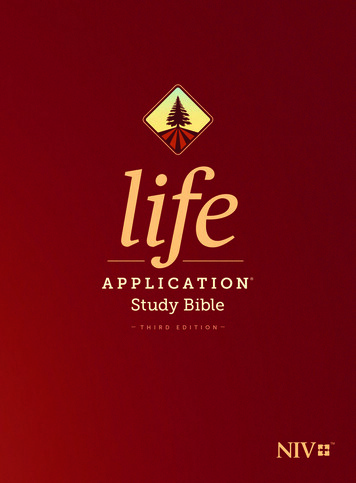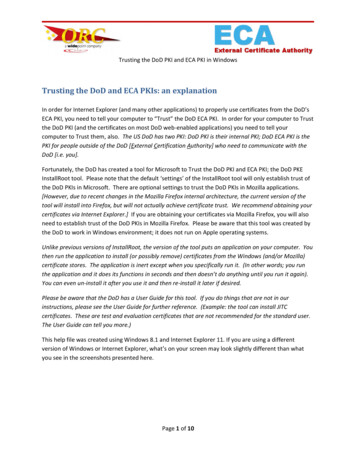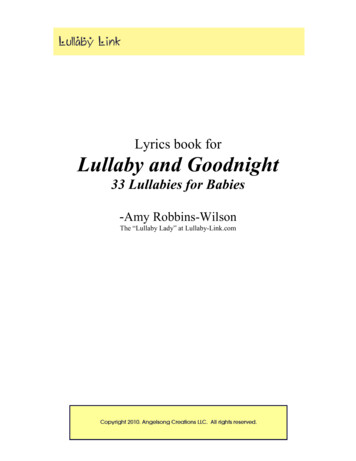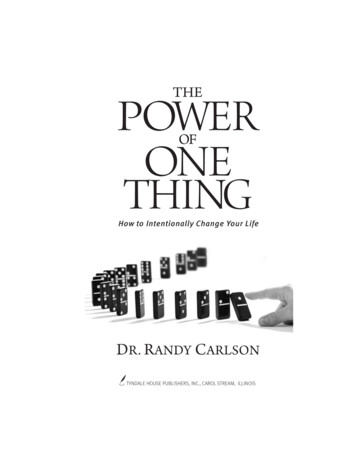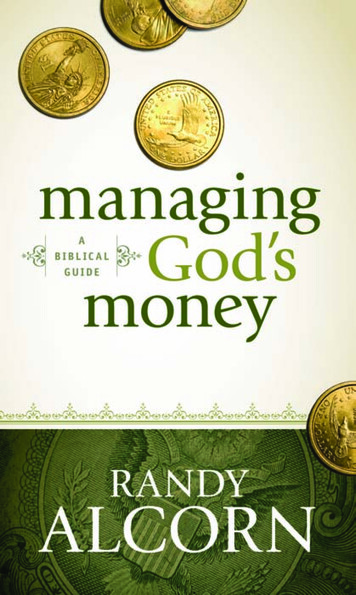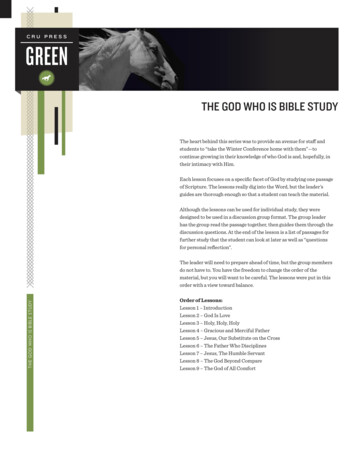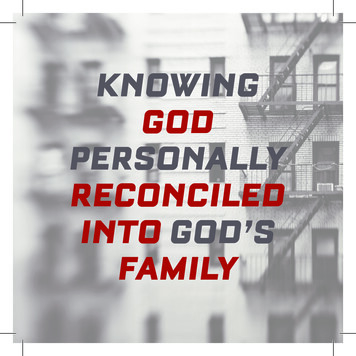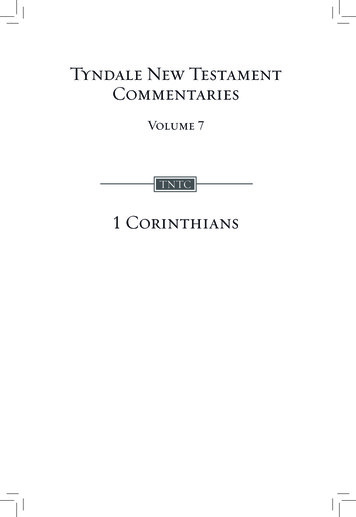
Transcription
TRUSTINGGODJERRY BRIDGESA NavPress resource published in alliancewith Tyndale House Publishers, Inc.
NavPress is the publishing ministry of The Navigators, an internationalChristian organization and leader in personal spiritual development.NavPress is committed to helping people grow spiritually and enjoy livesof meaning and hope through personal and group resources that arebiblically rooted, culturally relevant, and highly practical.For more information, visit www.NavPress.com.Trusting GodCopyright 1988, 2008 by Jerry Bridges. All rights reserved.Trusting God Discussion GuideCopyright 1989, 2008 by Jerry Bridges. All rights reserved.A NavPress resource published in alliance with Tyndale House Publishers, Inc.NAVPRESS and the NAVPRESS logo are registered trademarks of NavPress, The Navigators, ColoradoSprings, CO. TYNDALE is a registered trademark of Tyndale House Publishers, Inc. Absence of in connection with marks of NavPress or other parties does not indicate an absence of registration of those marks. The Team:Don Pape, EditorDavid Zimmerman, Acquisitions EditorJulie Chen, DesignerAuthor photograph by Steve LearnedAll Scripture quotations, unless otherwise indicated, are taken from the Holy Bible, New Inter national Version, NIV. Copyright 1973, 1978, 1984 by Biblica, Inc. Used by permission. All rights reservedworldwide. Scripture verses marked ph are taken from The New Testament in Modern English by J. B. Phillips, copyright J. B. Phillips, 1958, 1959, 1960, 1972. All rights reserved.Scripture quotations marked kjv are taken from the Holy Bible, King James Version.Some of the anecdotal illustrations in this book are true to life and are included with the permission of thepersons involved. All other illustrations are composites of real situations, and any r esemblance to people living or dead is purely coincidental.For information about special discounts for bulk purchases, please contact Tyndale House Publishers atcsresponse@tyndale.com or call 800-323-9400.Library of Congress Cataloging-in-Publication DataNames: Bridges, Jerry, author. Bridges, Jerry, author. Trusting God.Title: Trusting God with study guide : even when life hurts / Jerry Bridges.Description: Colorado Springs : NavPress, 2016. Includes bibliographical references.Identifiers: LCCN 2016039826 (print) LCCN 2016044451 (ebook) ISBN 9781631467929 (softcover) ISBN 9781631467936 (Apple) ISBN 9781631467943 (E-Pub) ISBN 9781631467950 ( Kindle)Subjects: LCSH: Providence and government of God—Christianity. Trust in God—Christianity. Providence and government of God—Christianity—Textbooks. Trust in God—Christianity—Textbooks.Classification: LCC BT96.3 .B755 2016 (print) LCC BT96.3 (ebook) DDC 231/.5—dc23LC record available at https://urldefense.proofpoint.com/v2/url?u https-3A lccn.loc.gov 2016039826&d DQIFAw&c 6BNjZEuL DAs869UxGis0g&r ZlF6A1J SMm9xAyjgyDor34CB-fqQRaraBLNVSdnrVo&m ZyQ3UGHQkcCey-cYZcMndiFSUnvDxuWy97BDVmpTEpk&s KOQG-h2ZP O1qIqpDUIUah0rBrK4xJf8iq Vpd5Yvxs&e ISBN 978-1-63146-792-9Printed in the United States of America227216205194183172161
CONTENTSPreface viiChapter 1:Chapter 2:Chapter 3:Chapter 4:Chapter 5:Chapter 6:Chapter 7:Chapter 8:Chapter 9:Chapter 10:Chapter 11:Chapter 12:Chapter 13:Chapter 14:Can You Trust God? 1Is God in Control? 11The Sovereignty of God 23God’s Sovereignty over People 45God’s Rule over the Nations 65God’s Power over Nature 85God’s Sovereignty andOur Responsibility 99The Wisdom of God 111Knowing God’s Love 131Experiencing God’s Love 145Trusting God for Who You Are 157Growing through Adversity 173Choosing to Trust God 195Giving Thanks Always 209DISCUSSION GUIDEHow to Use This Discussion Guide 223Lesson 1: Can You Trust God? 227Lesson 2: Is God in Control? 237
Lesson 3:Lesson 4:Lesson 5:Lesson 6:Lesson 7:Lesson 8:Lesson 9:Lesson 10:Lesson 11:Lesson 12:God’s Sovereignty over People 249God’s Rule over the Nations 259God’s Power over Nature 267God’s Sovereignty and OurResponsibility 275The Wisdom of God 285Knowing and Experiencing God’sLove 293Trusting God for Who You Are 303Growing through Adversity 313Choosing to Trust God 323Giving Thanks Always 331Help for Leaders 341Notes 349Author 355
PREFACEWhen I was fourteen years old, my mother died suddenly, without warning. I was in the adjoining room and rushed in justin time to see her gasp her last breath. I was stunned and devastated. My older brother was away at school, and my dad wastoo stricken with grief himself to be able to help me. Worst ofall, I did not know how to turn to God in times of trouble. Iwas alone in my adversity.That was not the first time adversity had struck in my life,and it was certainly not to be the last. As the Scripture says, “Yetman is born to trouble as surely as sparks fly upward” (Job 5:7).All of us experience adversity at different times and in varyingdegrees throughout our lives.Learning to trust God in adversity has been a slow and difficult process for me. It is a process that is still under way. Butseveral years ago, in an effort to strengthen my own trust inGod, I began a lengthy Bible study on the subject of God’ssovereignty in the affairs of His people. That study has helpedme immeasurably, and it is the fruit of that study I now sharewith you.During the time of the study, which actually covered a periodvii
TRUSTING GODof about four years, I encountered other believers who werestruggling with some of the same issues I was: Does God actually control the circumstances of our lives, or do “bad” thingsjust happen to us because we live in a sin- cursed world? If Godreally does control the circumstances of our lives, why did Heallow my friend to get cancer? Can I truly trust God when thegoing gets tough in different areas of my life?This book, then, was born out of the results of addressing needs in my own life and realizing that many other believers have similar questions and doubts. It is written from theperspective of a brother and companion to all those who aretempted at times to ask, “Can I really trust God?”Trusting God has been a difficult book to write. For onething, I have become much more aware of the widespread andfrequent occurrences of adversity around me. I had not realized as acutely as I do now the pervasive nature of sufferingand heartache, especially among believers. As a result of myheightened perception of suffering around me, I found myselffrequently asking, “Do I truly believe what I am writing?”Another difficulty for me has been the realization that many ofmy friends have experienced far greater adversity than I have. Whoam I to seek to write words of instruction and encouragementto them when I have not experienced the measure of pain theyhave? My answer to that question is the realization that the truthof God’s Word and the encouragement it is intended to give isnot dependent upon my experience. I have not written this bookabout my experiences, which are not particularly unusual. I havewritten it as a Bible study about God and His sovereignty, wisdom, and love as they bear upon the adversities we all encounter.Trusting God is written for the average Christian who hasnot necessarily experienced major catastrophe but who does frequently encounter the typical adversities and heartaches of life:viii
Prefacethe pregnancy miscarriage, the lost job, the auto accident, therebellious son or daughter, the unfair professor in college. Theseevents do not make the “front page” of our lives; indeed, theyare often buried within a broken or confused heart. Because oftheir low- keyness, they usually generate very little prayer support from our Christian friends.I sincerely hope that none of the statements I make in thefollowing chapters come across as glib and easy answers to thedifficult problems of adversity and suffering. There are no easyanswers. Adversity is difficult even when we know God is incontrol of our circumstances. In fact, that knowledge sometimes tends to aggravate the pain. “If God is in control,” we ask,“why did He allow this to happen?”The purpose of this book is twofold: First, I desire to glorify God by acknowledging His sovereignty and His goodness.Second, I desire to encourage God’s people by demonstratingfrom Scripture that God is in control of their lives, that He doesindeed love them, and that He works out all the circumstancesof their lives for their ultimate good.The reader will notice an abundance of quotations fromother writers. This book, though, is not merely a synthesis ofother people’s views. The basic convictions stated in these chapters are the result of my own personal Bible study done over along period of time. I acknowledge, however, my indebtednessto other writers for affirmation and, in some instances, clarification of my understanding of some of these truths.I want to express my appreciation to a number of people whohave contributed to the writing of this book. Don Simpson,my friend as well as editor, encouraged me, helped me, andsometimes challenged my conclusions as we worked throughthese chapters together. Dr. J. I. Packer graciously agreed toreview some of the key chapters to check their theologicalix
TRUSTING GODa ccuracy— though he should not be held responsible for thefinal results. Jessie Halsell performed the very necessary andchallenging task of transforming my handwritten pages to atyped manuscript. A special word of appreciation must go toGrace Peterson, a “senior saint,” for her colaborship in prayer.Although a number of friends prayed for me during the elevenmonths of writing, Grace was always available when I sensed theneed for that extra push of prayer to get over a difficult hurdle.Finally, I want to pay tribute to my first wife, Eleanor, now withthe Lord, who herself experienced major adversity, even as I waswriting this book, for her love and the sacrifices she made toallow me the time to study and write.x
Chapter OneCAN YOU TRUST GOD?And call upon me in the day of trouble;I will deliver you, and you will honor me.Psalm 50:15The letter did not bring good news. A close relative, very dearto me, had just learned she had bone cancer. Malignant cellsfrom a previous bout with cancer had lain dormant for eightyears before invading the skeletal parts of her body. One hip wasalready almost destroyed; the doctor was amazed she was stillable to walk. Such incidents are all too common these days. Infact, during the writing of this chapter I had seven friends, allwith cancer, listed on my “urgent” prayer page.But cancer or other physical ailments are obviously not theonly source of anxiety. Over lunch a few weeks ago a businessman friend confided that his company is perilously close tobankruptcy; another friend experiences heartache over a spiritually rebellious teenager. The truth is, all of us face adversityin various forms and at different times. A best- selling book bya secular psychiatrist put it very well with this simple openingstatement: “Life is difficult.”Adversity and its accompanying emotional pain comein many forms. There may be the heartache of an unhappy1
TRUSTING GODmarriage or the disappointment of a miscarried pregnancy orgrief over a spiritually indifferent or rebellious child. There isthe anxiety of the family breadwinner who has just lost his joband the despair of the young mother who has learned she hasa terminal illness.Others experience the frustration of dashed hopes andunfulfilled dreams: a business that turned sour or a career thatnever developed. Still others experience the sting of injustice,the dull ache of loneliness, and the stabbing pain of unexpectedgrief. There is the humiliation of rejection by others, of demotion at work, and, worst of all, of failure that is one’s ownfault. Finally there is the despair of realizing that some difficult circumstances— a physical infirmity of your own or perhaps aseverely handicapped child— will never change.All of these circumstances and scores more contribute to theanxiety and emotional pain we all experience at various timesand in varying degrees. Some pain is sudden, traumatic, anddevastating. Other adversities are chronic, persistent, and seemingly designed to wear down our spirits over time.In addition to our own emotional pains, we often are calledupon to help bear the pain of others, either friends or relatives.None of the illustrations I’ve used in the preceding paragraphsare just imaginary. I could put names alongside each one. Mostof them are on my personal prayer list. When friends and lovedones hurt, we hurt.On a larger scale, we read in our daily newspapers or see onthe evening news instances of grief, heartache, and pain on amassive scale. War, terrorism, earthquakes, famine, racial injustice, murder, and exploitation occur daily in various parts ofthe world. The threat of a nuclear holocaust hanging over ourheads has caused this period of history to be called the ageof anxiety. In such days when massive crises appear on our2
Can You Trust God?television screens almost daily, even the Christian is tempted toask, “Where is God? Doesn’t He care about the thousands whoare starving in Africa or the innocent civilians who are beingbrutally murdered in many war-ravished countries around theworld?”On a much smaller scale, those whose lives are free frommajor pain still experience the frequently frustrating or anxiety- producing events of daily life, which momentarily grab ourattention and rob us of our peace of mind. A l ong- plannedvacation has to be cancelled because of illness, the washingmachine breaks down the day company arrives, your class notesare lost or stolen the day before a major exam, you tear yourfavorite dress on the way to church, and on and on. Instancesof this magnitude are numerous. Life is full of them.It is true that such mundane events are only temporary andpale into insignificance alongside the truly tragic events of life.Yet, for most of us, life is filled with such little events, little frustrations, little anxieties, and little disappointments that temptus to fret, fume, and worry. One author has aptly captured theflavor of how such little frustrations can cause us to doubt Godin a devotional book for high schoolers entitled, If God LovesMe, Why Can’t I Get My Locker Open? We may smile a little atthe scene such a title brings to our imagination, but the fact is,this is the plane of adversity on which many of us live each day.And it is in the crucible of even this minor level of adversity thatwe are tempted to wonder, “Can I trust God?”Even when life seems to be going our way and our daily pathseems pleasant and smooth, we do not know what the futureholds. As Solomon said, “[We] do not know what a day maybring forth” (Proverbs 27:1). Someone has described life as likehaving a thick curtain hung across one’s path, a curtain thatrecedes before us as we advance, but only step by step. None of3
TRUSTING GODus can tell what is beyond that curtain; none of us can tell whatevents a single day or hour may bring into our lives. Sometimesthe receding curtain reveals events much as we had expectedthem; often it reveals events most unexpected and frequentlymost undesired. Such events, unfolding in ways contrary to ourdesires and expectations, frequently fill our hearts with anxiety,frustrations, heartache, and grief.God’s people are not immune from such pain. In fact, it oftenseems as if theirs is more severe, more frequent, more unexplainable, and more deeply felt than that of the unbeliever. The problem of pain is as old as the history of man and just as universal.Even creation itself, Paul tells us, has been subjected to frustrationand groans as in the pain of childbirth (see Romans 8:20‑22).So the question naturally arises, “Where is God in all ofthis?” Can you really trust God when adversity strikes and fillsyour life with pain? Does He indeed come to the rescue of thosewho seek Him? Does He, as the text at the beginning of thischapter affirms, deliver those who call upon Him in the dayof trouble? Does the Lord’s unfailing love surround the personwho trusts in Him (see Psalm 32:10)?Can you trust God? The question itself has two possiblemeanings before we attempt to answer it. Can you trust God?In other words, is He dependable in times of adversity? But thesecond meaning is also critical: Can you trust God? Do you havesuch a relationship with God and such a confidence in Himthat you believe He is with you in your adversity even thoughyou do not see any evidence of His presence and His power?It is not easy to trust God in times of adversity. No oneenjoys pain, and when it comes, we want it relieved as quicklyas possible. Even the apostle Paul pleaded with God three timesto take away the thorn in his flesh before he finally found God’sgrace to be sufficient. Joseph pleaded with Pharaoh’s cupbearer4
Can You Trust God?to “get me out of this prison” (Genesis 40:14). And the writerof Hebrews very honestly states, “No discipline seems pleasantat the time, but painful” (Hebrews 12:11).During the time I was working on this chapter I experiencedone of those periods of adversity when I found it difficult to trustGod. Mine happened to be a physical ailment that exacerbateda lifelong infirmity. It came at a very inconvenient time and forseveral weeks would not respond to any medical treatment.During those weeks, as I continually prayed to God forrelief, I was reminded of Solomon’s words,Consider what God has done:Who can straightenwhat he has made crooked?Ecc l e s i a s t e s 7 : 1 3God had brought a “crooked” event into my life, and Ibecame acutely aware that only He could straighten it. CouldI trust God whether or not He straightened my “crook” andrelieved my distress? Did I really believe that a God who lovedme and knew what was best for me was in control of my situation? Could I trust Him even if I didn’t understand?Further, could I encourage others to trust Him when they arein the throes of emotional pain? Is the whole idea of trusting Godin adversity merely a Christian shibboleth that doesn’t stand up inthe face of the difficult events of life? Can you really trust God?I sympathize with those who find it difficult to trust Godin adversity. I have been there often enough myself to knowsomething of the distress, the despair, and the darkness that fillsour souls when we wonder if God truly cares about our plight. Ihave spent a good portion of my adult life encouraging people topursue holiness, to obey God. Yet, I acknowledge it often seemsmore difficult to trust God than to obey Him. The moral will5
TRUSTING GODof God given to us in the Bible is rational and reasonable. Thecircumstances in which we must trust God often appear irrational and inexplicable. The law of God is readily recognized to begood for us, even when we don’t want to obey it. The circumstances of our lives frequently appear to be dreadful and grim orperhaps even calamitous and tragic. Obeying God is worked outwithin well- defined boundaries of God’s revealed will. TrustingGod is worked out in an arena that has no boundaries. We donot know the extent, the duration, or the frequency of the painful, adverse circumstances in which we must frequently trustGod. We are always coping with the unknown.Yet it is just as important to trust God as it is to obey Him.When we disobey God, we defy His authority and despise Hisholiness. But when we fail to trust God, we doubt His sovereignty and question His goodness. In both cases we cast aspersions upon His majesty and His character. God views our distrustof Him as seriously as He views our disobedience. When thepeople of Israel were hungry, “they spoke against God, saying,‘Can God spread a table in the desert? . . . Can he supply meatfor his people?’” The next two verses tell us, “When the Lordheard them, he was very angry . . . for they did not believe inGod or trust in his deliverance” (Psalm 78:19‑22).In order to trust God, we must always view our adverse circumstances through the eyes of faith, not of sense. And just asthe faith of salvation comes through hearing the message of thegospel (see Romans 10:17), so the faith to trust God in adversity comes through the Word of God alone. It is only in theScriptures that we find an adequate view of God’s relationshipto and involvement in our painful circumstances. It is only fromthe Scriptures, applied to our hearts by the Holy Spirit, that wereceive the grace to trust God in adversity.In the arena of adversity, the Scriptures teach us three essen6
Can You Trust God?tial truths about God— truths we must believe if we are to trustHim in adversity. They are: God is completely sovereign. God is infinite in wisdom. God is perfect in love.Someone has expressed these three truths as they relate tous in this way: “God in His love always wills what is best forus. In His wisdom He always knows what is best, and in Hissovereignty He has the power to bring it about.”The sovereignty of God is asserted, either expressly or implicitly, on almost every page of the Bible. While doing the Biblestudy preparation for writing this book I never felt I completelyfinished compiling the list of verses on the sovereignty of God.New references to it kept appearing almost every time I openedmy Bible. We are going to look at many of these passages in laterchapters, but for now consider just one:Who can speak and have it happenif the Lord has not decreed it?Is it not from the mouth of the Most Highthat both calamities and good things come?L a m e n tat i o n s 3 : 3 7 ‑ 3 8This passage of Scripture offends many people. They find itdifficult to accept that both calamities and good things comefrom God. People often ask the question, “If God is a God oflove, how could He allow such a calamity?” But Jesus Himselfaffirmed God’s sovereignty in calamity when Pilate said to Him,“Don’t you realize I have power either to free you or to crucify you?” Jesus replied, “You would have no power over meif it were not given to you from above” (John 19:10‑11). Jesusacknowledged God’s sovereign control over His life.7
TRUSTING GODBecause God’s sacrifice of His Son for our sins is such anamazing act of love toward us, we tend to overlook that it wasfor Jesus an excruciating experience beyond all we can imagine.It was for Jesus in His humanity a calamity sufficient to causeHim to pray, “My Father, if it is possible, may this cup be takenfrom me” (Matthew 26:39), but He did not waver in His assertion of God’s sovereign control.Rather than being offended over the Bible’s assertion ofGod’s sovereignty in both good and calamity, believers shouldbe comforted by it. Whatever our particular calamity or adversity may be, we may be sure that our Father has a loving purposein it. As King Hezekiah said, “Surely it was for my benefit thatI suffered such anguish” (Isaiah 38:17). God does not exerciseHis sovereignty capriciously but only in such a way as His infinite love deems best for us. Jeremiah wrote,Though he brings grief, he will show compassion,so great is his unfailing love.For he does not willingly bring afflictionor grief to the children of men.L a m e n tat i o n s 3 : 3 2 ‑ 3 3God’s sovereignty is also exercised in infinite wisdom, farbeyond our ability to comprehend. After surveying God’s sovereign but inscrutable dealings with His own people, the Jews,the apostle Paul bows before the mystery of God’s actions withthese words:Oh, the depth of the riches of the wisdom andknowledge of God!How unsearchable his judgments,and his paths beyond tracing out!Ro m a n s 1 1 : 3 38
Can You Trust God?Paul acknowledged what we must acknowledge if we are totrust God. God’s plan and His ways of working out His plan arefrequently beyond our ability to fathom and understand. Wemust learn to trust when we don’t understand.In subsequent chapters we will explore these three truths— the sovereignty, love, and wisdom of God— in greater detail.But the primary purpose of this book is not to explore thesewonderful truths. The primary purpose is for us to become soconvinced of these truths that we appropriate them in our dailycircumstances, that we learn to trust God in the midst of ourpain, whatever form it may take. It does not matter whetherour pain is trivial or traumatic, temporary or interminable.Regardless of the nature of the circumstances, we must learn totrust God if we would glorify God in them.But there is one final thought before we begin our studieson the sovereignty, love, and wisdom of God. In order to trustGod we must know Him in an intimate, personal way. Davidsaid in Psalm 9:10, “Those who know your name will trust inyou, for you, Lord, have never forsaken those who seek you.”To know God’s name is to know Him in an intimate, personalway. It is more than just knowing facts about God. It is coming into a deeper personal relationship with Him as a result ofseeking Him in the midst of our personal pain and discoveringHim to be trustworthy. It is only as we know God in this personal way that we come to trust Him. As you read and studythe following chapters and as you relate what you are learningabout God to your own situations, pray that the Holy Spirit ofGod will enable you to get beyond the facts about God so thatyou will come to know Him better, and so be able to trust Himmore completely.9
Lesson 3: God’s Sovereignty over People 249 Lesson 4: God’s Rule over the Nations 259 Lesson 5: God’s Power over Nature 267 Lesson 6: God’s Sovereignty and Our Responsibility 275 Lesson 7: The Wisdom of God 285 Lesson 8: Knowing and Experiencing God’s Love 293 Lesson 9: Trusting God for Who You Are
